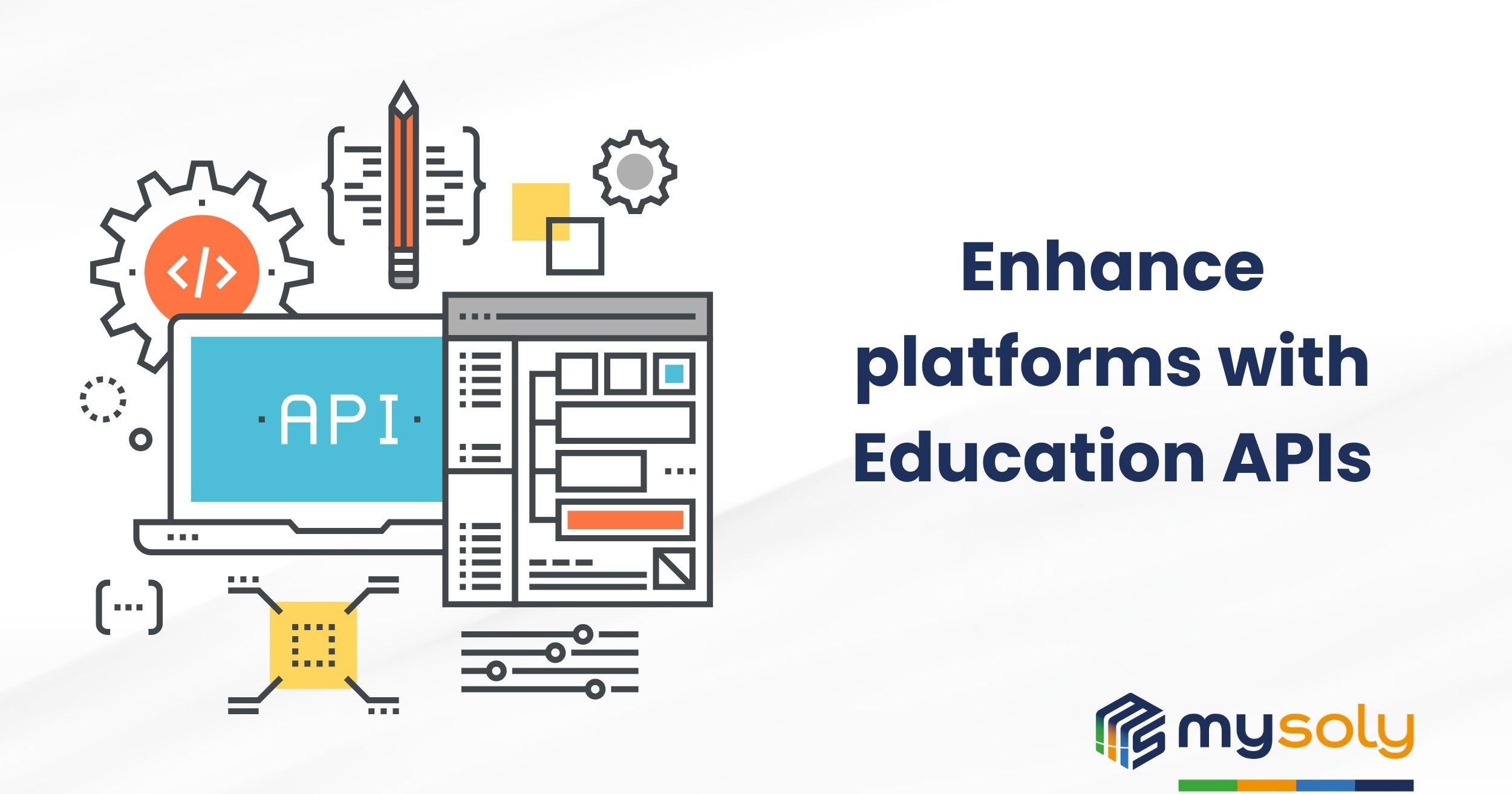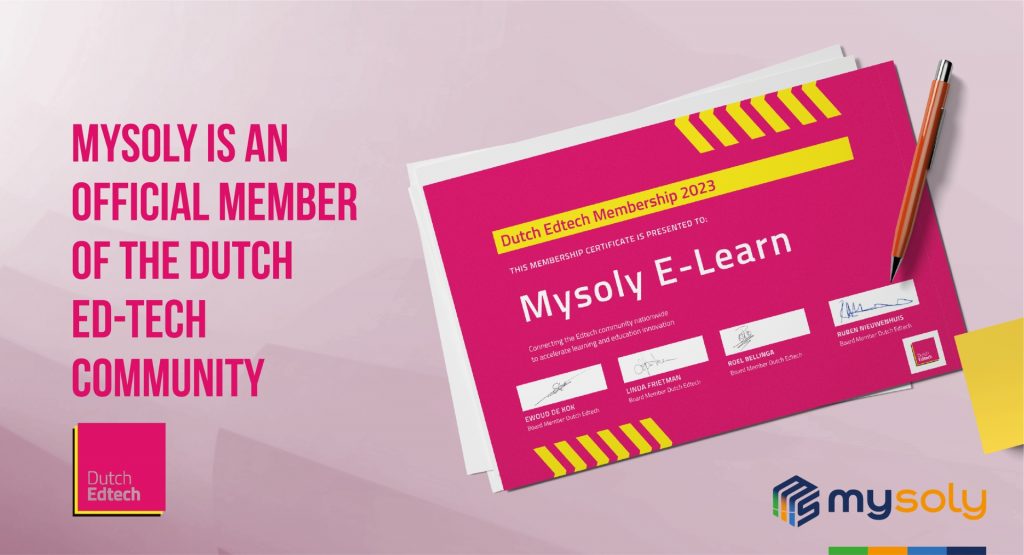EdTech API Development
Empower learning solutions for today’s organizations
As digital learning becomes more common, organizations look for new ways to enhance their educational platforms with smart integrations. At this point, EdTech API development enables seamless connections between systems, empowering education providers to create adaptable, efficient, and impactful learning experiences. At Mysoly, we focus on building AI-based learning solutions to strengthen content development, learning management, and training processes across diverse industries.
What is EdTech API development?
API development in EdTech refers to creating specific connections between learning tools, allowing different systems to “speak” with each other. For educational organizations, this means integrating applications like learning management systems (LMS) with AI-powered tools to enhance functionality and provide a unified, personalized experience. Also, API integrations enable platforms to share essential information, automate processes, and enhance content delivery, without the need to re-engineer existing systems.
Why do EdTech organizations need API solutions?
1. Enhanced learning management
- API development helps connect and streamline various learning management functions. For example, AI-based APIs enable real-time data exchange between applications, making it easier to manage course content, track learner progress, and automate feedback. Thus, learners can receive relevant updates instantly. On the other hand, educators have access to real-time insights, improving overall learning outcomes.
2. Customized learning experiences
- Through powerful API integrations, EdTech organizations can offer learners a personalized experience. APIs allow applications to exchange data about learners’ activities and preferences, which AI tools can then use to deliver tailored recommendations or custom learning paths. After analyzing user behavior, platforms can provide specific content and resources. So, the learning journey becomes more engaging and relevant.
3. Efficient content development
- Thanks to API integrations, content development becomes more dynamic. Because APIs allow different tools and resources to work together, enabling faster and smoother content creation. For instance, integrating a content management system (CMS) with an LMS through APIs simplifies content updates across platforms. So, organizations can create, organize, and distribute content seamlessly, saving time and reducing redundancy.
4. Scalable learning solutions
- As educational organizations grow, their systems need to keep up. APIs offer scalability, meaning platforms can adapt to changing needs without a full system rebuild. API-based solutions can integrate new functionalities or scale existing ones. So, EdTech providers can evolve their offerings over time. For example, a platform can add new AI-based features or integrate with additional learning tools, extending its capabilities as the organization grows.
5. Data-driven insights
- API integrations enable real-time data collection across applications. So, organizations have a comprehensive view of learner performance and engagement. Thanks to seamless API connections, LMS platforms can gather insights on learner progress, interaction, and content effectiveness. This data can then be analyzed to inform decision-making, refine learning materials, and improve future learning outcomes.
Key API Solutions in EdTech
1. Cloud-based API integration
- Cloud-based API integrations allow organizations to synchronize data seamlessly across platforms. So, all applications are updated in real-time. This flexibility is crucial for EdTech providers that operate in cloud environments, as it allows for scalable solutions that grow with the organization. A unified system ensures that learners and educators have access to the latest resources without any delay, improving both engagement and accessibility.
2. AI-Powered API as a Service
- API as a Service (APIaaS) provides dynamic, real-time interactions between applications. Thus, platforms enhance learning experiences without extensive reprogramming. AI-powered APIaaS solutions help EdTech organizations automate tasks like grading, generating feedback, and monitoring progress. These services make learning environments more interactive and responsive, allowing content to stay relevant and adaptive to learner needs.
3. Automated API Testing for Consistency
- Automated API testing ensures that all API connections are reliable and functional. In EdTech, this is especially important, as seamless performance is essential to maintaining trust and engagement. Automated testing detects issues early on. And, this ensures all applications work smoothly together. So, organizations can reduce disruptions and keep learning processes consistent and reliable.
4. Custom API Integration for Tailored Solutions
- Custom API integrations allow organizations to address their unique needs by creating specialized data flows or application interactions. For EdTech providers, this could mean custom integrations that facilitate course enrollment, data tracking, or adaptive learning pathways. With a tailored approach, educational platforms can offer specific features that align with organizational goals and learner needs. This creates a more focused and efficient learning environment.
5. Third-Party API Integration for Expanded Functionality
- On the other hand, EdTech platforms can quickly expand their features with third-party APIs. Third-party tools, like AI-based feedback systems or adaptive learning modules, can be integrated to support a richer learning experience. For example, using a third-party language processing API can provide instant feedback on writing assignments, while a data visualization API could offer real-time progress tracking for learners.
How EdTech API Development Transforms Learning
1. Streamlined Processes
- API development streamlines organizational processes by connecting different applications and automating routine tasks. With efficient data flow between tools, teams can focus on enhancing educational content rather than managing systems. Also, this streamlining is vital for organizations looking to reduce time spent on administrative tasks. So, it enables them to dedicate more resources to improving learner outcomes.
2. Improved Learner Engagement
- Thanks to AI-driven tools, EdTech platforms can offer learners a more engaging experience. Personalized content recommendations, automated feedback, and adaptive quizzes are all possible through API integrations. This makes learning more dynamic and responsive. With these enhancements, learners are more likely to stay engaged and motivated, improving their overall experience.
3. Cost-Effective Growth
- API integrations allow EdTech platforms to expand their functionality without a full system overhaul. And, this makes growth more cost-effective. Organizations can integrate new learning tools, data analytics, or communication features as needed. As a result, it minimizes downtime and development costs. Also, this flexible approach allows for continuous improvements that support an organization’s growth strategy.
4. Real-Time Data Accuracy
- Real-time data synchronization reduces the chance of outdated or incorrect information, which is critical in education. Learners receive accurate feedback. On the other hand, instructors can monitor progress without delays. APIs also ensure that data is handled securely and responsibly, maintaining trust in the platform.
5. Future-Ready Solutions
- In the rapidly changing EdTech industry, being adaptable is essential. With API-driven development, platforms can respond quickly to new technologies or shifts in educational needs. As tools and methods evolve, organizations can add or update APIs to keep their offerings relevant and effective.
Conclusion
In a competitive EdTech landscape, having a connected and adaptable platform is key. With EdTech API development, organizations can leverage AI-based learning solutions to enhance content management, learning delivery, and engagement. These API-driven enhancements enable organizations to offer dynamic, personalized, and scalable learning experiences that meet the demands of modern education. Embrace the future of EdTech with powerful API integrations and take your learning solutions to the next level.
Mysoly | Your partner in digital!
bilal cangal serkan kilic



